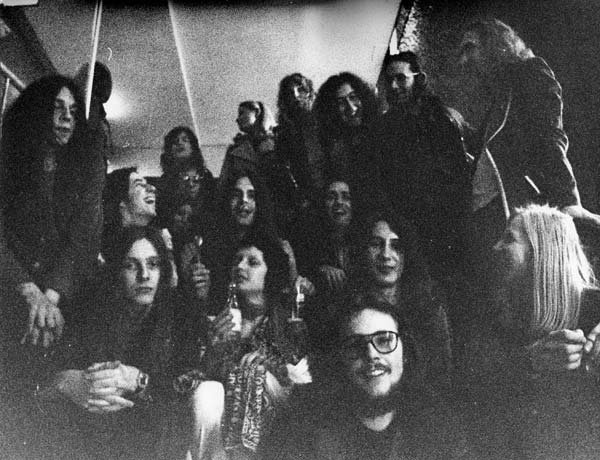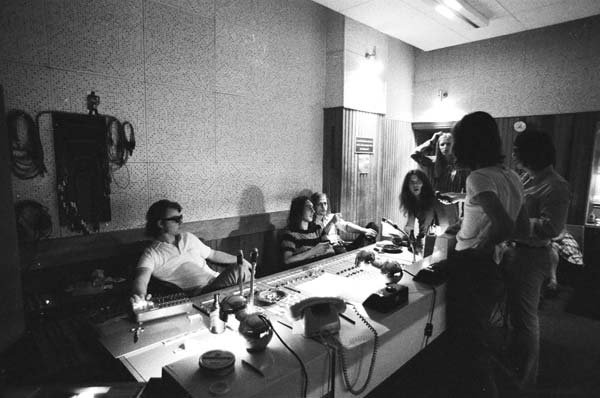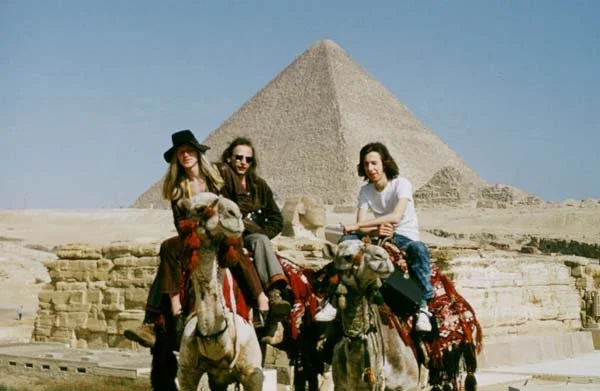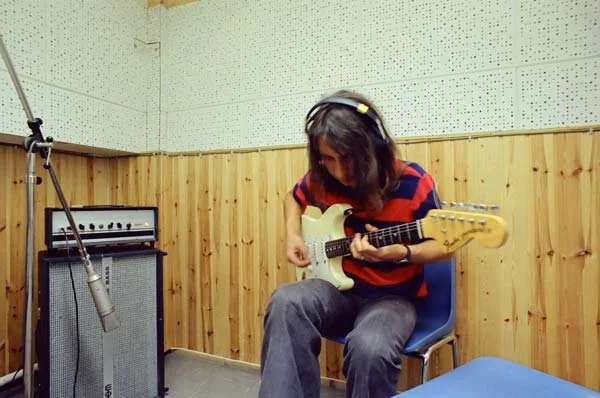Lutz Lüül Graf-Ulbrich - Agitation Free
When and where were you born? What was growing up like for you? When did you first begin playing music?
I was born 1952 in Berlin. Very nice! We lived very close to the Grunewald forrest, my childhood was really pleasant in a nice neighborhood. At the age of 10. When I heard the song „Roll over Beethoven“ played by The Beatles I was immediately hooked. I asked my father to buy me a guitar. I wanted to become musician and start a band.
Who were some of your influences early on? Where would you go to see shows in your community and what groups/ performances stood out to you the most during that time? What would you and your friends do for fun back in the day?
The Beatles, The Stones, The Kinks, The Pretty Things. There were not many clubs to go to, only some so called „Jugendheime“. These were clubs for the youth run by the Berlin Senate. You had to wear a tie to get in. We went there each week and saw bands which mostly played soul music and cover songs. Fooling around, playing soccer, playing in the nearby forrest, hanging around in the city.
Did you participate in any groups prior to Agitation Free? When did you first meet your band mates and what led to the decision to put the band together in ‘67? When and where did you guys first get together to rehearse and what was that experience like?
Yes. First band was titled The Tigers, then The Sentries. October of ‘67. Christopher Franke and I were playing with The Sentries, Ludwig Kramer and Michael Günther were playing with Ugly Things. We decided to put a band together which became Agitation, later Agitation Free. We rehearsed at some nearby house at Karolinger Platz. Then we rehearsed in the cellar of Chris’ parent’s house.
When did you make your first live debut playing music in front of an audience? How did the name for the group come about? Tell me about Agitation Free becoming the house band for the infamous Zodiac club in Berlin. What were those gigs like?
I Cannot recall the exact gig, but with Agitation we played in a Bethanien Kirche (Church) at a music festival back in the early days. You can see glimpse of it in - Eichkamp“. We looked it up in the dictionary! And when we played a promo gig at a club they put Free behind Agitation (for Free admission). So we kept it as we thought it would fit well into our concept of music. We knew Conrad Schnitzler and Hans Joachim Roedelius, they had a band called Plus/Minus. I think they invited us. So we became sort of house band, playing from 11 p.m. until 4 h in the morning. I cannot remember how we got our equipment there and how we managed to stay awake at school as we were only 16 years old!
Is it true that vocalist John L. was fired around this time, for his potential naked stage antics? What did you guys want to solidify within the band before hitting the studio? Tell me about recording the band’s legendary debut LP “Malesch”. When and where did recording begin in ‘72 and what was that process like for you and the group?
Haha, yeah, that is correct as he got more and more crazy and was always performing naked. The problem was that he showed up on concerts nevertheless and stripped on stage. It took a while until that was over. The band was together for nearly five years before recording its first record. We should have recorded much earlier when we played with Ax Genrich back in 1970, but he left the band (Guru Guru) as did Christopher Franke (Tangerine Dream), so only Michael Günther and myself were left in the band and we had to start all over again with new members Jörg Schwenke, Burghard Rausch and Michael Hoenig. That took a while. We recorded the album during one week in July 1972 at the renowned audio Tonstudio. The problem was to find a way to shorten our long improvisations into a format that fitted into an album. As we were not used to play short tracks. We then used the recordings we had done during our tour in the Near East to bring something of that atmosphere into the album. We all were still very much impressed by this trip as it had made a big impact on us with this culture clash. Also Keyboarder Peter Michael Hamel came by and contributed on the Hammond organ.
How did the deal with Vertigo come about? What was the first order of business once the album was released? The band released its second, “2nd”, album the following year in ‘73. Can you tell me about writing as well as recording this record? What did you guys want to explore with this album that maybe you couldn’t with the previous?
Peter Michael Hammel introduced us to Schott Verlag and we played a concert together with Between and another band which lead to the deal. No idea. All in all we wer not very happy with our record company. They did not support us as we had expected, especially in France where we were touring quite often and had a bigger fan crowd than in Germany. This record was influenced a lot by guitar player Stephan Diez who had joined the band just before the recordings as we had split up with Jörg Schwenke due to his drug problems. We were touring in France and had the opportunity to stay at a farm with a concert club near Lyon called “Arc en Ciel“. We were rehearsing there for a week and went to the Studio 70 in Munic for two weeks. It was a complete different approach as they time we were better prepared and we had real songs and more structured compositions. We also were much more experienced and worked more effectively. Plus we had one more week this time. But I also recall some tensions between Stephan and myself and he left the band after the recordings but gave us his compositions, which was a nice gesture.
‘76 saw the release of “Last”. The title is pretty self-explanatory. What were the band’s ambitions and visions for this release? How did the deal with Barclay come about? What eventually happened to the band after this? Did you continue to play music after the Agitation Free?
Well, the band had split up a bit too early and we still had a big following in France, I was living in Paris with Nico at the time, so I contacted Barclay and they were interested in producing it even the band was over. It took a while to get the original tapes from Berlin to Paris, but all in all the deal went very well with Barclay if you take into account that the band did not exist anymore. Not much! Every one went his own way. When I got back to Berlin in 76 we once tried to reactivate the band once again with Michael Günther and some new members like drummer Harald Grosskopf but apart from some sessions and two photo sessions the band never played one concert and gave up before even got started. No, only as mentioned above. I was living and touring as guitar player with singer Nico for the rest of the seventies. We lived in Paris, Berlin, Amsterdam and stayed in New York for half a year at the Chelsea Hotel. We also toured a bit in Canada, san Francisco and Los Angeles. Greta times. We played a memorabel gig with John Cale at the CBGB.
What have you been up to in more recent years? Agitation Free released multiple bodies of work throughout the 90’s. What is the legacy of the band to you? When you reflect back on your time in Agitation Free, what are you most proud of?
The last 25 years were I was busy playing with an acoustic band called „17 Hippies“. We played concerts all over the world, but a complete different from Krautrock. We had a great time and I am very proud and happy to have been part of it. I also produce my own singer/songwriter records over the years with songs under my name Lüül and am touring with my band here in Germany. My recent record “Der stille Tanz“ just had won the Preis der deutschen Schallplattenkritik, which is a big honour. Over the years I also was part of the Neo Krautrock formation Fanger/ Schönwälder feat. Lutz Graf-Ulbrich and we produced a couple of albums. Unfortunately Thomas Fanger passed away this year and this is over. We were very surprised that Krautrock became popular after all this years. No one had expected that, so of course we tried to put out as much material as possible as there was an audience out there. Meanwhile also China fans are listening to Agitation Free!
We feel great and happy that younger generations were influenced by our music and still are. That is fantastic. Krautrock became a trade mark and great artists like David Bowie and others became fans. First of all our attitude to explore new sounds and new ways of making music and forget about the tradition. Avantgarde composer Thomas Kessler was a huge influence for us at the Electronic Beat Studio in Berlin. And of course our tour into Near East as it gave us a real push, a big step in our career and lead to a lot of following things. For example in Lebanon we met a young guy - Assaad Debs - who was so thrilled by our show that he decided to become concert promoter in Paris. He then organized a lot of tours with Agitation Free, and later also with Can, Tangerine Dream and other German bands in France. Also he managed Nico and I got to know her because of him and that also was and still is a very big thing in my life.
Is there anything else you would like to further share with the readers?
I am very grateful that after all these years there are still new generations who explore our music and that feels good. In these days where everything is planned it makes me happy that people are longing for this kind of freedom and adventure we produced in our music. And for those who are asking what are they doing now I can promise that we will put out a new album probably in spring 2023 on which we are working now with the original members Burghard Rausch and Michael Hoenig.
https://luul.de/?fbclid=IwAR04f3OI0uGEahpdrmSK75nNUhKF86oGz2xyBUkPSb1_YOcbT0bz2fbo_hQ
Dakota Brown









































